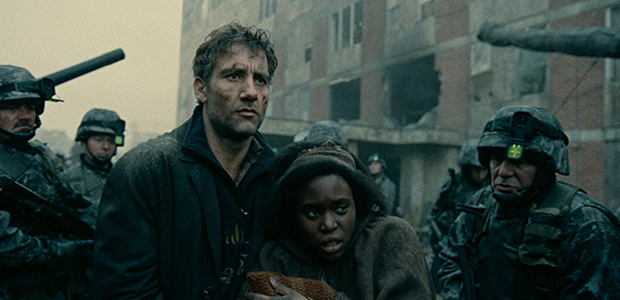
Alfonso Cuaron’s Children of Men is a rare film; it is almost perfect. Grim, critical of the present and yet somehow hopeful, it is a meditation on the implications and consequences of scientific advances that feels like a cross breed of 12 Monkeys and Brazil. It is easy to classify the film as science fiction – it is set in 2027 after all – but the chronology of the film becomes less relevant as it progresses. This could be the state of our Earth a year from now.
The visceral, almost virtuoso filmmaking style of Mexican Cuaron gives the film an added realism that is frightening. There are moments of shocking, unexpectedly violent bursts that stay with you long after the scenes have transpired. In one such moment, Theo (Clive Owen) the weary ex-husband of Julian (Julianne Moore) makes his way through a military camp housing protesting illegal immigrants picked from all over London, with gunshots, tank fire and fiery explosions ringing throughout the wide expanse of the screen, till faint droplets of blood get smeared on the camera and stay there until the end of the sequence. The technique is not new, it uses handheld cameras and a single take unedited shot, but in the manner it is framed, with great help from DP Emmanuel Lubezki, it becomes at once magnificent and frightening to watch. Of all the war movies and action films released this year, nothing is as edgy as watching a man trying to outrun a mini street battle to save his own life, but also purportedly mankind’s last hope. This hope, in a future where women have become mysteriously infertile, comes in the form of the first pregnant woman in over 18 years. Children of Men offers no explanations about how this situation came to be, though theories abound, mostly courtesy of Theo’s witty friend Jasper (Michael Caine). Entrusted with escorting the woman to safety, Theo runs into every imaginable obstacle, from political self-servitude to the mutual distrust of people who are dissimilar, with the end objective of reaching the people who run what is known as ‘the human project’, the last hope of finding a lasting cure.
It is sometimes claimed that good science fiction can take on attributes of a horror film either because it features creatures from the unknown or because of the extent of humanities depravity at a future point in time. In Children of Men humanity is indirectly the cause of the threat unleashed upon itself and we are ultimately our own worst enemy. Though small in scope (the film covers a very limited scale in the wide-ranging politics of the world it inhabits) I was able to completely believe all that I saw. Cuaron once again proves as he did with the best Harry Potter adaptation (Prisoner of Azkaban) and his breakthrough film Y Tu Mama Tambien that he is fearless in the pursuit of his vision. This approach makes the film seem smart and doesn’t allow it to spend too much time with expositions. Within minutes of the opening scene, and after we have found out that this is the distant future, the first sight we see is of rickshaws peddling the streets of London. There are blink and miss recreations of incidents from Abu Gharib and a running criticism of Britain’s Homeland Security, yet none of these are dwelled upon. Collectively, the film is expansively and supremely original, not only by science fiction standards but by which we judge exceptional films. The ending, abiding by the nature of the truest science fiction films, is bleak yet possesses an ethereal hopefulness that manages to add a lot more clout. I can’t remember the last time a story about human desperation and struggle made me want to cheer at the possibilities of a glowing outcome. Children of Men made me react in just this way.
Rating: 



